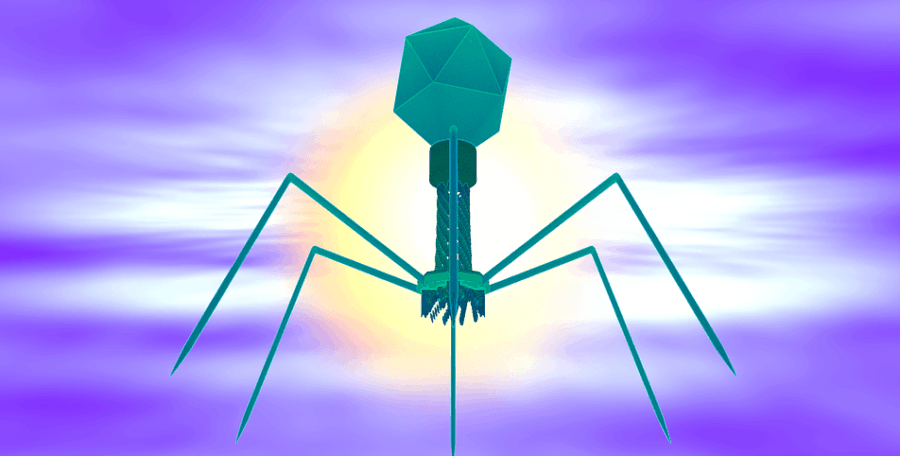Intentionally putting viruses into one’s body might seem like a bad idea, but a study conducted at Colorado State University has demonstrated that a combination of bacteria-killing viruses is not only safe for humans, but seems to reduce gastrointestinal inflammation and combat E. coli.
Results from the research by CSU have confirmed the safety and tolerability of using viruses known as bacteriophages to reduce targeted bacterial species in the gut. The new treatment could be used to reduce inflammation-causing bacteria in the gastrointestinal tract and promote the growth of beneficial bacteria known to enhance gastrointestinal health, immune function, and anti-inflammatory processes.
“If you told someone to go eat viruses for a month, they’d probably say you’re crazy,” said study co-investigator Tiffany Weir, an associate professor in CSU’s Department of Food Science and Human Nutrition. “Bacteriophages are pretty cool, because their host range is so specific that you’re not going to get sick from them. The ones we used infect E. coli cells and cause them to explode.”
Alternative to antibiotics
In some cases, bacteriophages may offer an alternative to antibiotics, which kill bacterial species less discriminately.
“People taking antibiotics can develop resistance and experience gastrointestinal distress, since antibiotics kill both bad and good bacteria in the gut,” said study co-investigator Taylor C. Wallace, principal and CEO of the Think Healthy Group Inc. and professor in the Department of Nutrition and Food Studies at George Mason University. “Using bacteriophages that infect only specific types of bacteria spares the many good bacteria in the gut that are linked to numerous long-term beneficial health outcomes. We have shown for the first time that bacteriophage treatment has no apparent side effects in humans, at least with short-term use.”
The Bacteriophage for Gastrointestinal Health (PHAGE) Study — the first U.S. clinical study of its kind to provide patients with bacteriophages — was published Aug. 29 in the Journal of the American College of Nutrition.
About bacteriophages
Bacteriophages can selectively combat specific microorganisms in people without causing any type of infection or disrupting the microbiota, the natural population of microbes found in and on our bodies. In addition to treating bacteria-related gastrointestinal illnesses, the researchers are developing new human studies that assess the effectiveness of bacteriophages, in the form of dietary supplements, on other age- and obesity-related chronic diseases, such as cardiovascular disease, that are thought to be influenced by the microbiome.
The PHAGE study, conducted in 2016-17 at CSU’s Human Performance Clinical Research Laboratory, involved 36 individuals who self-reported occasional gastrointestinal distress — including constipation, diarrhea, gas, bloating, or abdominal pain — but were not diagnosed with a specific gastrointestinal disorder like Crohn’s disease. Study participants were assigned to either a placebo or treatment group for the first four weeks of the study, followed by a two-week washout period and an additional four weeks on the opposite treatment. The group received four bacteriophage strains that target E. coli, a common pathogen that can contribute to gastrointestinal irregularities and stomach upset.
“We used a combination of four strains to prevent the bacteria from developing resistance to the phages,” Weir said.
No adverse effects
The researchers report that study participants tolerated the bacteriophage treatment extremely well, with no adverse effects. Preliminary analysis also showed that bacteriophage treatment significantly decreased circulating interleukin 4, a protein often associated with allergic response and inflammatory disorders including dermatitis and rheumatoid arthritis. While the overall gut microbiota remained stable, E. coli populations were reduced.
The researchers say bacteriophages might also be useful for eliminating nutritional deficiencies due to chronic diarrhea, and they are seeking larger-scale support to test which strains might be best for this application. Chronic diarrhea and associated malnutrition are the second-most common causes of childhood death worldwide.
Weir noted that scientists explored the use of bacteriophages to treat ailments like dysentery in the early 1900s. At the time, the process proved time-consuming because it required doctors to sample and grow bacteria in the lab to identify the infection before selecting appropriate bacteriophages, so they were abandoned in favor of the faster antibiotics approach.
“With the current interest in modifying the gut bacteria for improved health, people are beginning to seriously look at phages again for the first time in nearly 100 years,” Weir said.
Colorado residents interested in participating in the next phase of the research, which will feature a combination of bacteriophages and a probiotic, can email [email protected].
The Department of Food Science and Human Nutrition is part of CSU’s College of Health and Human Sciences.
If our reporting has informed or inspired you, please consider making a donation. Every contribution, no matter the size, empowers us to continue delivering accurate, engaging, and trustworthy science and medical news. Independent journalism requires time, effort, and resources—your support ensures we can keep uncovering the stories that matter most to you.
Join us in making knowledge accessible and impactful. Thank you for standing with us!

